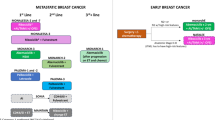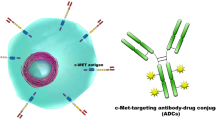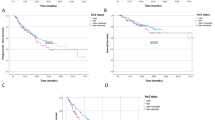Abstract
Objective
FoxM1 transcription factor contributes to tumor metastasis and poor prognosis in many cancers including triple-negative breast cancer (TNBC). In this study, we examined the effects of FoxM1 inhibitor Thiostrepton (THIO) alone or in combination with MEK inhibitor Selumetinib (SEL) on metastatic parameters in vitro and in vivo.
Methods
Cell viability was determined by MTT assay. Immunoblotting and immunohistochemistry was used to assess metastasis-related protein expressions in 4T1 cells and its allograft tumor model in BALB/c mice. In vivo uPA activity was determined by enzymatic methods.
Results
Both inhibitors were effective on the expressions of FoxM1, ERK, p-ERK, Twist, E-cadherin, and Vimentin alone or in combination in vitro. THIO significantly decreased 4T1 cell migration and changed the cell morphology from mesenchymal-like to epithelial-like structure. THIO was more effective than in combination with SEL in terms of metastatic protein expressions in vivo. THIO alone significantly inhibited mean tumor growth, decreased lung metastasis rate and tumor foci, however, no significant changes in these parameters were observed in the combined group. Immunohistochemically, FoxM1 expression intensity was decreased with THIO and its combination with SEL in the tumors.
Conclusions
This study suggests that inhibiting FoxM1 as a single target is more effective than combined treatment with MEK in theTNBC allograft model. The therapeutic efficacy of THIO should be investigated with further studies on appropriate drug delivery systems.





Similar content being viewed by others
References
Sung H, Ferlay J, Siegel RL, Laversanne M, Soerjomataram I, Jemal A, Bray F (2021) Global cancer statistics 2020: GLOBOCAN estimates of incidence and mortality worldwide for 36 cancers in 185 countries. CA Cancer J Clin 0:1–41
Gelmon K, Dent R, Mackey JR, Laing K, McLeod D, Verma S (2012) Targeting triple-negative breast cancer: optimising therapeutic outcomes. Ann Oncol 23:2223–2234
Lehmann BD, Jovanović B, Chen X, Estrada MV, Johnson KN, Shyr Y, Moses HL, Sanders ME, Pietenpol JA (2016) Refinement of Triple-Negative Breast Cancer Molecular Subtypes: Implications for Neoadjuvant Chemotherapy Selection. PLoS ONE 11:e0157368
O’Reilly EA, Gubbins L, Sharma S et al (2015) The fate of chemoresistance in triple negative breast cancer (TNBC). BBA Clin 3:257–275
Collignon J, Lousberg L, Schroeder H, Jerusalem G (2016) Triple-negative breast cancer: Treatment challenges and solutions. Breast Cancer Targets Ther 8:93–107
Yu C, Chen L, Yie L, Wei L, Wen T, Liu Y, Chen H (2015) Targeting FoxM1 inhibits proliferation, invasion and migration of nasopharyngeal carcinoma through the epithelial-to-mesenchymal transition pathway. Oncol Rep. https://doi.org/10.3892/or.2015.3834
Liao G, Bin, Li XZ, Zeng S, Liu C, Yang SM, Yang L, Hu CJ, Bai JY (2018) Regulation of the master regulator FOXM1 in cancer. Cell Commun Signal 16:1–15
Raychaudhuri P, Park HJ (2011) FoxM1: A Master Regulator of Tumor Metastasis: Figure 1. Cancer Res 71:4329–4333
Hamurcu Z, Delibaşı N, Nalbantoglu U et al (2019) FOXM1 plays a role in autophagy by transcriptionally regulating Beclin-1 and LC3 genes in human triple-negative breast cancer cells. J Mol Med 97:491–508
Xu N, Jia D, Chen W et al (2013) FoxM1 Is Associated with Poor Prognosis of Non-Small Cell Lung Cancer Patients through Promoting Tumor Metastasis. PLoS ONE 8:e59412
Dai J, Yang L, Wang J, Xiao Y, Ruan Q (2015) Prognostic Value of FOXM1 in Patients with Malignant Solid Tumor: A Meta-Analysis and System Review. Dis Markers 2015:1–10
Lu X-F, Zeng D, Liang W-Q, Chen C-F, Sun S-M, Lin H-Y (2018) FoxM1 is a promising candidate target in the treatment of breast cancer. Oncotarget 9:842–852
Khongkow P, Gomes AR, Gong C et al (2016) Paclitaxel targets FOXM1 to regulate KIF20A in mitotic catastrophe and breast cancer paclitaxel resistance. Oncogene. https://doi.org/10.1038/onc.2015.152
Zona S, Bella L, Burton MJ, Nestal de Moraes G, Lam EWF (2014) FOXM1: An emerging master regulator of DNA damage response and genotoxic agent resistance. Biochim Biophys Acta - Gene Regul Mech 1839:1316–1322
Kong FF, Qu ZQ, Yuan HH et al (2014) Overexpression of FOXM1 is associated with EMT and is a predictor of poor prognosis in non-small cell lung cancer. Oncol Rep 31:2660–2668
Ziegler Y, Laws MJ, Sanabria Guillen V et al (2019) Suppression of FOXM1 activities and breast cancer growth in vitro and in vivo by a new class of compounds. npj Breast Cancer 5:45
Dey P, Wang A, Ziegler Y, Kim SH, El-Ashry D, Katzenellenbogen JA, Katzenellenbogen BS (2020) Suppression of Tumor Growth, Metastasis, and Signaling Pathways by Reducing FOXM1 Activity in Triple Negative Breast Cancer. Cancers (Basel) 12:2677
Tabatabaei-Dakhili SA, Aguayo-Ortiz R, Domínguez L, Velázquez-Martínez CA (2018) Untying the knot of transcription factor druggability: Molecular modeling study of FOXM1 inhibitors. J Mol Graph Model 80:197–210
Chen Y, Ruben EA, Rajadas J, Teng NNH (2015) In silico investigation of FOXM1 binding and novel inhibitors in epithelial ovarian cancer. Bioorg Med Chem 23:4576–4582
Kwok JMM, Myatt SS, Marson CM, Coombes RC, Constantinidou D, Lam EWF (2008) Thiostrepton selectively targets breast cancer cells through inhibition of forkhead box M1 expression. Mol Cancer Ther 7:2022–2032
Tan Y, Wang Q, Xie Y, Qiao X, Zhang S, Wang Y, Yang Y, Zhang B (2019) Identification of FOXM1 as a specific marker for triple-negative breast cancer. Int J Oncol 54:87–97
Deschênes-Simard X, Kottakis F, Meloche S, Ferbeyre G (2014) ERKs in Cancer: Friends or Foes? Cancer Res 74:412–419
Braicu B et al (2019) A Comprehensive Review on MAPK: A Promising Therapeutic Target in Cancer. Cancers (Basel) 11:1618
Adeyinka A, Nui Y, Cherlet T, Snell L, Watson PH, Murphy LC (2002) Activated mitogen-activated protein kinase expression during human breast tumorigenesis and breast cancer progression. Clin Cancer Res 8:1747–1753
Gee JMW, Robertson JFR, Ellis IO, Nicholson RI (2001) Phosphorylation of Erk1 / 2 Mitogen-Activated Protein Kinase Is Associated With Poor Response To Anti-Hormonal Therapy and. Int J cancer 95:247–254
Mueller H, Flury N, Eppenberger-Castori S, Kueng W, David F, Eppenberger U (2000) Potential prognostic value of mitogen-activated protein kinase activity for disease-free survival of primary breast cancer patients. Int J Cancer 89:384–388
Esteva FJ, Sahin AA, Smith TL, Yang Y, Pusztai L, Nahta R, Buchholz TA, Buzdar AU, Hortobagyi GN, Bacus SS (2004) Prognostic significance of phosphorylated P38 mitogen-activated protein kinase and HER-2 expression in lymph node-positive breast carcinoma. Cancer 100:499–506
Ma RYM (2005) Raf/MEK/MAPK signaling stimulates the nuclear translocation and transactivating activity of FOXM1c. J Cell Sci 118:795–806
Chan DW, Hui WWY, Cai PCH, Liu MX, Yung MMH, Mak CSL, Leung THY, Chan KKL, Ngan HYS (2012) Targeting GRB7/ERK/FOXM1 Signaling Pathway Impairs Aggressiveness of Ovarian Cancer Cells. PLoS ONE 7:e52578
Metro G, Chiari R, Baldi A, De Angelis V, Minotti V, Crinò L (2013) Selumetinib: a promising pharmacologic approach for KRAS-mutant advanced non-small-cell lung cancer. Future Oncol 9:167–177
Haslett K, Koh P, Hudson A, Ryder WD, Falk S, Mullan D, Taylor B, Califano R, Blackhall F, Faivre-Finn C (2021) Phase I trial of the MEK inhibitor selumetinib in combination with thoracic radiotherapy in non-small cell lung cancer. Clin Transl Radiat Oncol 28:24–31
Campagne O, Yeo KK, Fangusaro J, Stewart CF (2021) Clinical Pharmacokinetics and Pharmacodynamics of Selumetinib. Clin Pharmacokinet 60:283–303
Zhou Y, Lin S, Tseng K-F, Han K, Wang Y, Gan Z, Min D, Hu H (2016) Selumetinib suppresses cell proliferation, migration and trigger apoptosis, G1 arrest in triple-negative breast cancer cells. BMC Cancer 16:818
Pulaski BA, Ostrand-Rosenberg S (2000) Mouse 4T1 Breast Tumor Model. Curr Protoc Immunol 39:1–16
Hegde NS, Sanders DA, Rodriguez R, Balasubramanian S (2011) The transcription factor FOXM1 is a cellular target of the natural product thiostrepton. Nat Chem 3:725–731
Jiang L, Wang P, Chen L, Chen H (2014) Down-regulation of FoxM1 by thiostrepton or small interfering RNA inhibits proliferation, transformation ability and angiogenesis, and induces apoptosis of nasopharyngeal carcinoma cells. Int J Clin Exp Pathol 7:5450–5460
Siraj AK, Pratheeshkumar P, Parvathareddy SK, Qadri Z, Thangavel S, Ahmed S, Al-Dayel F, Tulbah A, Ajarim D, Al-Kuraya KS (2018) FoxM1 is an independent poor prognostic marker and therapeutic target for advanced Middle Eastern breast cancer. Oncotarget 9:17466–17482
Calvisi DF, Pinna F, Ladu S et al (2009) Forkhead box M1B is a determinant of rat susceptibility to hepatocarcinogenesis and sustains ERK activity in human HCC. Gut 58:679–687
Park HJ, Gusarova G, Wang Z et al (2011) Deregulation of FoxM1b leads to tumour metastasis. EMBO Mol Med 3:21–34
Laoukili J, Alvarez M, Meijer LAT, Stahl M, Mohammed S, Kleij L, Heck AJR, Medema RH (2008) Activation of FoxM1 during G2 Requires Cyclin A/Cdk-Dependent Relief of Autorepression by the FoxM1 N-Terminal Domain. Mol Cell Biol 28:3076–3087
Lüscher-Firzlaff JM, Lilischkis R, Lüscher B (2006) Regulation of the transcription factor FOXM1c by Cyclin E/CDK2. FEBS Lett 580:1716–1722
Conacci-Sorrell M, Simcha I, Ben-Yedidia T, Blechman J, Savagner P, Ben-Ze’ev A (2003) Autoregulation of E-cadherin expression by cadherin–cadherin interactions. J Cell Biol 163:847–857
Bae G-Y, Choi S-J, Lee J-S, Jo J, Lee J, Kim J, Cha H-J (2013) Loss of E-cadherin activates EGFR-MEK/ERK signaling, which promotes invasion via the ZEB1/MMP2 axis in non-small cell lung cancer. Oncotarget 4:2512–2522
Wierstra I (2013) FOXM1 (Forkhead box M1) in Tumorigenesis. In: Cell Cycle. pp 191–419
Bao B, Wang Z, Ali S, Kong D, Banerjee S, Ahmad A, Li Y, Azmi AS, Miele L, Sarkar FH (2011) Over-expression of FoxM1 leads to epithelial-mesenchymal transition and cancer stem cell phenotype in pancreatic cancer cells. J Cell Biochem 112:2296–2306
Meng F-D (2015) FoxM1 overexpression promotes epithelial-mesenchymal transition and metastasis of hepatocellular carcinoma. World J Gastroenterol 21:196
Qian J, Luo Y, Gu X, Zhan W, Wang X (2013) Twist1 Promotes Gastric Cancer Cell Proliferation through Up-Regulation of FoxM1. PLoS ONE 8:e77625
Hong J, Zhou J, Fu J, He T, Qin J, Wang L, Liao L, Xu J (2011) Phosphorylation of Serine 68 of Twist1 by MAPKs Stabilizes Twist1 Protein and Promotes Breast Cancer Cell Invasiveness. Cancer Res 71:3980–3990
Pellikainen JM, Ropponen KM, Kataja VV, Kellokoski JK, Eskelinen MJ, Kosma V-M (2004) Expression of Matrix Metalloproteinase (MMP)-2 and MMP-9 in Breast Cancer with a Special Reference to Activator Protein-2, HER2, and Prognosis. Clin Cancer Res 10:7621–7628
Li H, Cao D, Liu Y et al (2004) Prognostic value of matrix metalloproteinases (MMP-2 and MMP-9) in patients with lymph node-negative breast carcinoma. Breast Cancer Res Treat 88:75–85
Jabłońska-Trypuć A, Matejczyk M, Rosochacki S (2016) Matrix metalloproteinases (MMPs), the main extracellular matrix (ECM) enzymes in collagen degradation, as a target for anticancer drugs. J Enzyme Inhib Med Chem 31:177–183
NOEL A, JOST M, MAQUOI E (2008) Matrix metalloproteinases at cancer tumor–host interface. Semin Cell Dev Biol 19:52–60
Wang Z, Banerjee S, Kong D, Li Y, Sarkar FH (2007) Down-regulation of Forkhead Box M1 Transcription Factor Leads to the Inhibition of Invasion and Angiogenesis of Pancreatic Cancer Cells. Cancer Res 67:8293–8300
Wang I-C, Chen Y-J, Hughes DE, Ackerson T, Major ML, Kalinichenko VV, Costa RH, Raychaudhuri P, Tyner AL, Lau LF (2008) FoxM1 Regulates Transcription of JNK1 to Promote the G1/S Transition and Tumor Cell Invasiveness. J Biol Chem 283:20770–20778
Yue M, Li S, Yan G, Li C, Kang Z (2018) Paeoniflorin inhibits cell growth and induces cell cycle arrest through inhibition of FoxM1 in colorectal cancer cells. Cell Cycle 17:240–249
Ai C, Zhang J, Lian S, Ma J, Győrffy B, Qian Z, Han Y, Feng Q (2020) FOXM1 functions collaboratively with PLAU to promote gastric cancer progression. J Cancer 11:788–794
Ma J, Qi G, Xu J, Ni H, Xu W, Ru G, Zhao Z, Xu W, He X (2017) Overexpression of forkhead box M1 and urokinase–type plasminogen activator in gastric cancer is associated with cancer progression and poor prognosis. Oncol Lett 14:7288–7296
Fantozzi A, Christofori G (2006) Mouse models of breast cancer metastasis. Breast Cancer Res 8:212
Meng J, Peng H, Dai B et al (2009) High level of AKT activity is associated with resistance to MEK inhibitor AZD6244 (ARRY-142886). Cancer Biol Ther 8:2073–2080
Balmanno K, Chell SD, Gillings AS, Hayat S, Cook SJ (2009) Intrinsic resistance to the MEK1/2 inhibitor AZD6244 (ARRY-142886) is associated with weak ERK1/2 signalling and/or strong PI3K signalling in colorectal cancer cell lines. Int J cancer 125:2332–2341
Khan MA, Jain VK, Rizwanullah M, Ahmad J, Jain K (2019) PI3K/AKT/mTOR pathway inhibitors in triple-negative breast cancer: a review on drug discovery and future challenges. Drug Discov Today 24:2181–2191
Acknowledgements
We thank to Dr. Gunes Esendagli for his valuable contributions to this study, Dr. Digdem Yoyen Ermis for assistance animal studies and Ilknur Gunduz for preparing pathological samples.
Funding
This work was supported by the Scientific and Technological Research Council of Turkey, (TUBITAK) under Grant (number 1002-116S162) and Teaching Staff Training Program of Turkey.
Author information
Authors and Affiliations
Contributions
FDK, IDT, AE participated in the design, interpretation of the studies and analysis of the data and review of the manuscript; FDK and GE conducted the experiments, FDK wrote the manuscript, and IDT, AE edited the manuscript.
Corresponding author
Ethics declarations
Conflict of interest
The authors declare that they have no conflicting interests.
Ethical approval
All applicable international, national, and/or institutional guidelines for the care and use of animals were followed. This article does not contain any studies with human participants.
Additional information
Publisher’s Note
Springer Nature remains neutral with regard to jurisdictional claims in published maps and institutional affiliations.
Rights and permissions
About this article
Cite this article
Demirtas Korkmaz, F., Dogan Turacli, I., Esendagli, G. et al. Effects of thiostrepton alone or in combination with selumetinib on triple-negative breast cancer metastasis. Mol Biol Rep 49, 10387–10397 (2022). https://doi.org/10.1007/s11033-022-07751-0
Received:
Revised:
Accepted:
Published:
Issue Date:
DOI: https://doi.org/10.1007/s11033-022-07751-0




